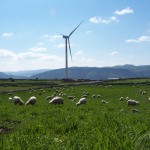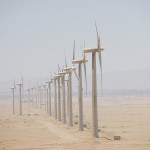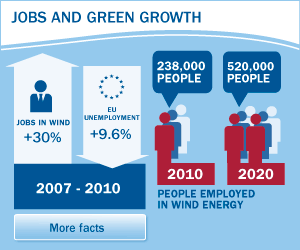 EWEA’s Communication Director looks at the need for greater grid investments…
EWEA’s Communication Director looks at the need for greater grid investments…
By Julian Scola
The sometimes destructive power of the wind has made the headlines a lot recently and this weekend it was the UK’s turn as the tail-end of hurricane Katia lashed the island nation. As the storm left UK shores on Monday, some newspapers reported a different kind of story – Scottish wind farms produced so much electricity that they were disconnected from the grid. A total of 13 wind farms were turned off on Monday morning as winds reached 90mph overloading the national grid, the Scottish Herald said.
 Austria will lead Europe when it comes to sourcing the highest percentage of electricity from renewable sources in 2020, according to recent analysis carried out by EWEA. The small, mountainous nation will source an impressive 71% of its electricity from renewables.
Austria will lead Europe when it comes to sourcing the highest percentage of electricity from renewable sources in 2020, according to recent analysis carried out by EWEA. The small, mountainous nation will source an impressive 71% of its electricity from renewables.
Next in line will be Sweden – set to source 63% of its electricity from renewables by 2020, followed by Latvia – 60%, Portugal – 55% and Denmark – 54%. At the other end of the scale, Poland, Estonia, Cyprus, Malta, the Czech Republic, Luxembourg and Hungary are all set to cover less than 20% of their electricity needs with renewable electricity.
 Wind power is expected to dominate Africa’s renewable energy sector over the next decade as the continent faces a massive struggle of providing electricity to remote communities, according to a new report by a global consultancy.
Wind power is expected to dominate Africa’s renewable energy sector over the next decade as the continent faces a massive struggle of providing electricity to remote communities, according to a new report by a global consultancy.
A Frost & Sullivan press release issued on Wednesday noted that the total renewable power investment in Africa, which was €2.5 billion by 2010, is expected to grow to €40 billion by the end of this decade.
“The key growth sectors will be wind power, solar power, geothermal power and foreign direct investment (FDI) into energy and power infrastructure,” the release quoted Ross Bruton, Frost & Sullivan’s energy and power systems industry analyst, as saying.
The release noted that Africa is the most poorly electrified continent in the world even though it has enough energy resources to more than adequately meet its existing and growing energy needs.
A just published report by Greenbang, covered by the Financial Times Energy Source blog, reveals that the market for ‘smart’ electricity in Europe is “set to expand rapidly in coming years” as more and more renewable energy comes online, government initiatives kick-in and overall demand for energy grows.
According to the report, up to 145 million new smart meters will be installed by the end of 2020 with Germany, the UK, Poland, France and Spain leading the way in a market that could be worth $25 billion by 2020. The EU has recently set the objective of installing smart meters in 80% of households across Europe by 2020.
Renewable energies like wind power are variable in nature, and smart management techniques help make their integration into the electricity system more cost-effective. A smart meter device in the home would notify users when electricity demand is high, and when electricity prices are higher, allowing them to switch off devices that do not need continuous electricity such as freezers, or to put the washing machine on at a cheaper time of day.
 EWEA’s Communication Director looks at the need for greater grid investments…
EWEA’s Communication Director looks at the need for greater grid investments…






 Comments
Comments

